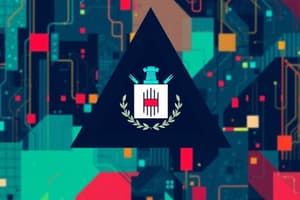Podcast
Questions and Answers
What term describes an entity that wishes to exploit vulnerabilities in a system?
What term describes an entity that wishes to exploit vulnerabilities in a system?
- Security Policy
- Risk
- Countermeasure
- Threat Agent (correct)
Which of the following represents a type of attack that can disrupt a system's functioning?
Which of the following represents a type of attack that can disrupt a system's functioning?
- Intrusion (correct)
- Passive Attack
- Misappropriation
- Observation
What is the purpose of a security policy in an organization?
What is the purpose of a security policy in an organization?
- To train system users
- To define rules for information security (correct)
- To configure network equipment
- To manage software updates
Which term refers to a situation where unauthorized access leads to data alteration?
Which term refers to a situation where unauthorized access leads to data alteration?
Which type of attack occurs from within an organization's network?
Which type of attack occurs from within an organization's network?
What is the primary objective of computer security as defined by NIST?
What is the primary objective of computer security as defined by NIST?
Which component of the CIA Triad primarily concerns data accuracy and trustworthiness?
Which component of the CIA Triad primarily concerns data accuracy and trustworthiness?
How does accountability assist in information security?
How does accountability assist in information security?
Which of the following challenges in information security relates to the need for regular vigilance?
Which of the following challenges in information security relates to the need for regular vigilance?
What is the role of authentication mechanisms in ensuring authenticity?
What is the role of authentication mechanisms in ensuring authenticity?
Study Notes
Information Security Concepts
- Computer Security protects an automated information system, ensuring integrity, availability, and confidentiality of resources, including hardware and software.
- The NIST Computer Security Handbook provides a foundational definition of Computer Security.
CIA Triad
- Confidentiality: Protects data privacy and ensures sensitive information is not disclosed.
- Integrity: Maintains the accuracy and reliability of data and systems, preventing unauthorized modifications.
- Availability: Ensures authorized users can access information and resources when needed.
- Authenticity: Verifies data and identities are genuine, confirming they originate from trusted sources.
- Accountability: Links actions to individuals, aiding in incident investigation and compliance with security policies.
Challenges of Information Security
- Security Complexity: Security solutions can be intricate and challenging to implement despite straightforward naming.
- Sneaky Attacks: Attackers often exploit subtle weaknesses within security frameworks.
- Unusual Procedures: Security measures can appear complex and unintuitive, complicating their adoption.
- Implementing Security: Choosing appropriate security measures requires thoughtful consideration and planning.
- Secrets and Protocols: Security involves managing confidential information and navigating complex communication protocols.
- Ongoing Battles: Defense mechanisms must continually adapt to outsmart attackers' tactics.
- Awareness and Importance: People frequently undervalue security until incidents occur, emphasizing the need for proactive measures.
- Regular Monitoring: Continuous oversight is crucial for effective security management.
- Early Integration: Security should be included in the initial development phase, not treated as an afterthought.
- Usability vs. Security: Achieving a balance is essential; strong security should not overly hinder usability.
Model for Information Security
- Computer system assets are categorized into hardware, software, data, and communication facilities.
- Essential components of information security include different software types (operating systems, applications) and their respective security mechanisms.
Information Security Terminology
- Important terms include adversary (threat agent), attack, countermeasure, risk, security policy, system resource (asset), threat, and vulnerabilities.
Security Concepts and Relationships
- Owners aim to mitigate risks while establishing security policies against threats posed by threat agents.
- Countermeasures are implemented to address vulnerabilities, factoring in various risks to computer systems.
Threats and Actions (Attacks)
- Threat consequences include disruption, exposure, interception, inference, intrusion, deception, and misuse.
- Types of attacks can be classified as either active or passive.
- Attacks may originate from inside (internal threats) or outside (external threats) of an organization.
Weekly Activity
- Analyze the security of an automated teller machine (ATM) system where users provide a PIN and card for account access, highlighting potential threats and security measures.
Studying That Suits You
Use AI to generate personalized quizzes and flashcards to suit your learning preferences.
Related Documents
Description
This quiz covers key concepts of Information Security, focusing on the CIA triad and the Information System Model. Dive into the definitions of computer security and explore relationships among threats, attacks, and assets. Perfect for reinforcing the foundational knowledge in information security.





